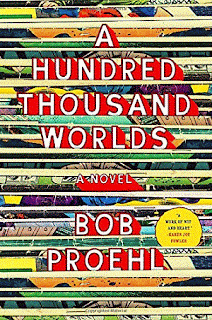A Hundred Thousand Worlds - Bob Proehl
Those readers among us who prefer that their fiction have a beginning and an end will not particularly like Bob Proehl’s
A Hundred Thousand Worlds. I can’t blame them. Oh, sure, the novel has a beginning (around page 1) and an ending (of sorts, slightly before page 368), but the story and the characters seem somehow to aimlessly wander through the interstices of the pages between those two points.
I will say that Proehl has a way with words, as the saying goes, but that's probably the only reason I managed to slog through this entire book. As for a plot, however, let’s just say that the concept at its core was lost on this particular reader. Of course I get it: the novel recounts the westward journey of Valerie Torrey and her nine-year-old son, Alex, as they return to LA from New York City. Exactly why they’re “returning,” however, and why they left in the first place spin out quite slowly (too slowly?) within the pages of the novel.
Val’s an actor, once the female heroine of a long-since cancelled scifi television series, a show that strikingly resembles “Continuum” (no word on whether Val looks like Rachel Nichols, though). Mother and son's westward migration takes place in three steps as she reprises her character at comics conventions in Cleveland, Chicago and LA; with side trips to see her mother and... "The Woman." The road show's cast of characters is padded out with Brett, a comic artist (who, unbeknownst to anyone but the readers, just broke up with a woman who once babysat Alex) and Gail, a lesbian comic writer. A Greek… errr, geek chorus of women in superhero costumes accompanies the little group on their journey. Enormous swaths of the text are given over to the “wonders” (I use the term sarcastically) of comic books, while little or nothing is given over to the motivations of the characters or even scene setting.




